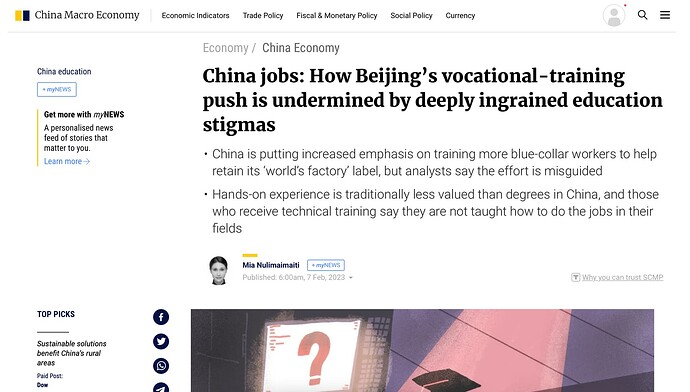- 23岁的计算机数控(CNC)专业学生郭文利发现很难在现实世界中应用他的技术技能,最后只好去卖房地产。
- 他班上的大多数学生未能掌握课程的实践部分,原因是缺乏操作机器的机会,而且教师大多是本科学位持有者,而不是技术工人。
- 中国正在努力解决蓝领工人的短缺问题,并通过鼓励学生接受技术教育和使技术技能更受欢迎来保留其作为世界工厂的地位。
- 中国估计到2025年制造业将短缺3000万工人,在工人短缺最多的100个职业中,有36个被归类为 “制造业和相关人员”。
- 由于工厂的劳动力短缺和对技术技能的需求,中国的职业学校正变得更具竞争力。然而,校企合作仍然薄弱,对制造业的变化趋势缺乏敏感度。
- 在中等职业学校中,只有不到10%的教师有专业的制造或商业管理经验,只有15%的教师接受过企业的技术培训。
- 缺乏蓝领技术工人是中国就业市场的一个突出问题,特别是在高精尖制造业等领域。
- 中国有1300多个专业和12万个职业教育点,超过70%的新一线工人来自职业学校。中国已经形成了约500个职业教育集团和24900个职业学校与企业共建的实习、培训基地。
- Guo Wenli, a 23-year-old computerized numerical control (CNC) major, found it difficult to apply his technical skills in the real world and ended up selling real estate.
- Most students in his class failed to master the practical part of the course due to a lack of opportunities to operate the machinery and teachers who were mostly undergraduate degree holders instead of skilled workers.
- China is trying to address the shortage of blue-collar workers and retain its place as the world’s factory by encouraging students to pursue technical education and by making technical skills more desirable.
- China estimated a shortage of 30 million workers in the manufacturing sector by 2025 and 36 of the 100 occupations with the greatest worker shortages were categorised as “manufacturing and related personnel”.
- Vocational schools in China are becoming more competitive due to the labour shortage in factories and the need for technical skills. However, there is still weak school-enterprise cooperation and a lack of sensitivity to changing trends in manufacturing.
- Less than 10% of teachers in secondary vocational schools have professional-manufacturing or business-management experience and only 15% have undergone technical training in companies.
- The lack of blue-collar skilled workers is a prominent problem in China’s job market, especially in fields such as high-precision manufacturing.
- There are more than 1,300 majors and 120,000 vocational education points in China and more than 70% of new frontline workers come from vocational schools. China has formed about 500 vocational education groups and 24,900 internship and training bases jointly built by vocational schools and enterprises.
3 Likes
